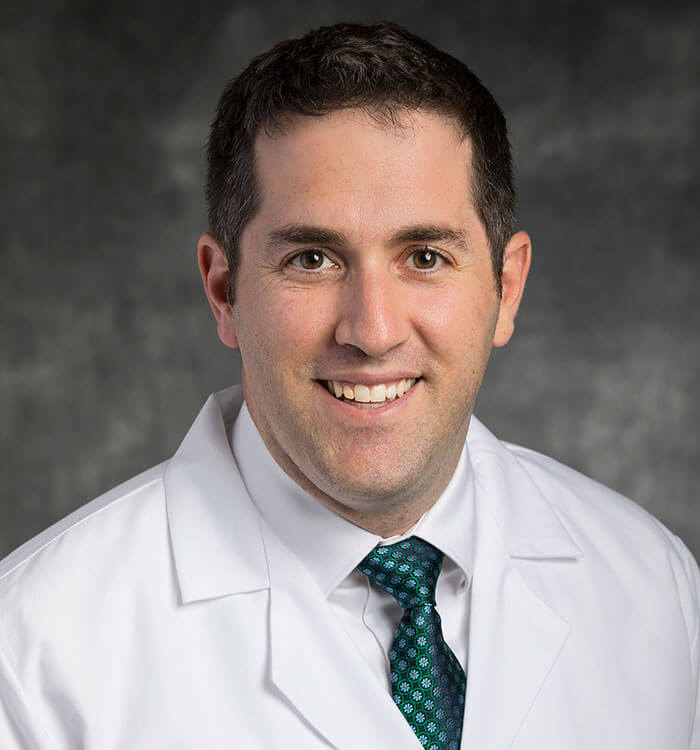UH Urologic Surgeon Offers Patients Rare Access to Life-changing Prostate Procedure
June 24, 2024
UH Clinical Update | June 2024
Prostate enlargement is common in men over 50, and can lead to urinary dysfunction as well as bladder or kidney problems. Even in ancient Egypt, men who lived long enough would often face symptoms of benign prostatic hyperplasia, or BPH, which may progress to urine retention and bladder stones.
 Michael Zell, MD
Michael Zell, MDHistorically, there wasn’t much that could be done and men often died of sepsis due to urinary retention and infections. Then, about a century ago, says Michael Zell, MD, a urologic surgeon at University Hospitals, a new treatment -- the transurethral resection of the prostate, also known as TURP -- was developed. Part of the prostate gland was removed to relieve urinary problems but the surgery was often complicated, and recovery could last several weeks, with the patient enduring restrictions and discomfort during that time.
Thankfully, today there are other options to deal with enlarged prostates, and Dr. Zell’s patients are often surprised at how simple and efficient the procedure can be, with the patient frequently being discharged the same day, and recovery lasting only a few days more. Dr. Zell, along with Dr. Irina Jaeger, are among just a few surgeons in Ohio, and a very small percentage of surgeons in the country, who perform the HoLEP (holmium laser enucleation of the prostate) procedure, and among even fewer surgeons who perform it with great frequency.His patients are mostly between 55 and 90 years old. “It’s a population I love working with,” says Dr. Zell, who operates at UH Ahuja Medical Center. “It’s great to help them and restore their quality of life.”
HoLEP requires no incision. Surgical entry is through the urethra, and whether the prostate is small or very large is irrelevant, and then the extremely precise holmium laser is used to cut through the prostate. Almost all of these procedures are done on an outpatient basis, and the patient returns for catheter removal within 24 to 48 hours, with a quick return to normal function.
HoLEP draws patients from throughout Ohio for the procedure, which Dr. Zell learned during his medical residency in the Department of Urology at the Mayo Clinic, Arizona.
Patients tell him how quickly their lives changed post-op. “It’s like night and day,” they’ll say. For months and years, they had suffered with complications that occur when the enlarged prostate interferes with bladder function.
“As the prostate grows, it causes obstructive and/or irritative urinary symptoms,” Dr. Zell explains. “The blocked bladder causes a weak stream, or straining, and retention of urine. Long-term obstruction in most men causes the bladder to become hyperactive, so they get urgency, frequency -- they might have to get up six or more times during the night. Some men suffer with urinary incontinence. Other men develop large, flaccid bladders with significant retention that, if left untreated, can lead to renal failure.”
“What I like about this focus in urology is that these men generally are relatively healthy, and if we can fix this problem, in a short time they feel like a new person,” Dr. Zell says.
Dr. Zell was recently honored with a “Cliff Appreciates/Dinner with the Doc” award. He was nominated by Jessica Goldstein, MD, the Chief Medical Officer at UH Ahuja Medical Center, for his “exemplary efforts in building relationships with the medical and nursing staff through (his) responsiveness, collaboration and clinical excellence. We also appreciate how (he) supported surgery APPs to mature the team and anchor them to UH Ahuja.”
Dr. Zell says all of it is done -- “with everyone on the same page” -- to provide the highest quality care for patients.
“We make sure the nursing staff knows what they are doing and understands why we are doing what we are doing, and how things are working,” he says. “We make sure that if they have a question we answer it.”
Treating people with respect and kindness, and empowering them with the tools and knowledge they need, is always a priority, he says. It allows them to know they are doing the right thing for patients.
“Seeing patients get better is the most rewarding part for all of us.”
Congratulations to Dr. Zell on his “Dinner with the Doc” honor.


